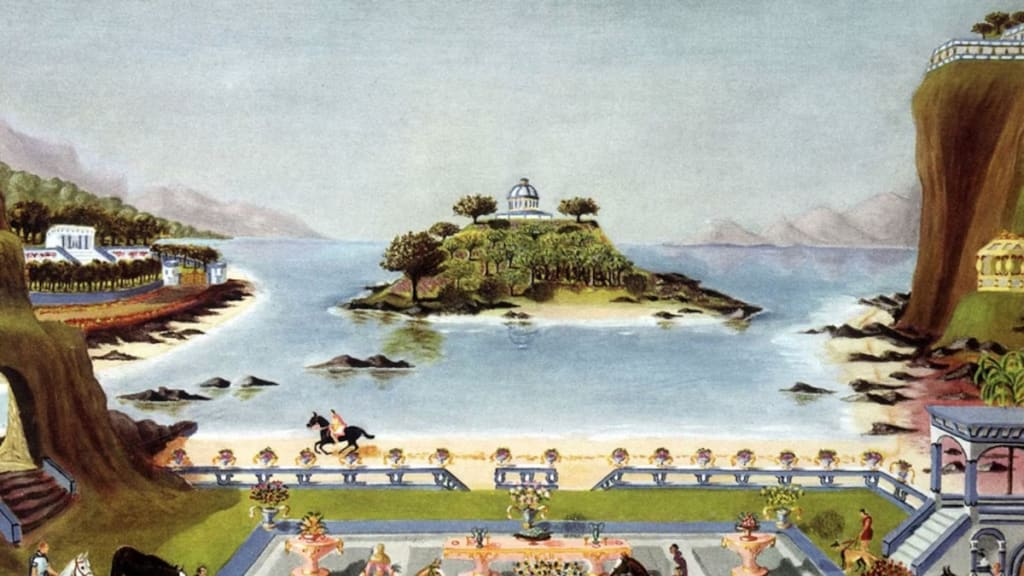
The Mystery of Atlantis: An Exploration of the Myth, Legend, and History
The legend of Atlantis has fascinated scholars, historians, and explorers for centuries. The mythical city, said to be a paradise of advanced technology, wealth, and knowledge, was believed to have sunk beneath the ocean in a single day and night of catastrophic events. While the story of Atlantis remains a mystery, its legacy has persisted through the ages, inspiring countless works of literature, art, and popular culture. This thesis article aims to explore the origin and development of the Atlantis myth, examine the various interpretations and theories surrounding it, and evaluate the historical evidence that may shed light on the truth behind the legend.
The Origin and Development of the Atlantis Myth
The story of Atlantis is said to have been first introduced by the Greek philosopher Plato, who wrote about it in two of his dialogues, the Timaeus and the Critias. In these works, Plato describes Atlantis as a powerful and wealthy empire that existed thousands of years before his own time, with advanced technology and a highly developed civilization. According to the legend, the city was built by Poseidon, the god of the sea, and was home to a race of people who were both intelligent and virtuous.
The downfall of Atlantis, as described by Plato, was brought about by the city's corruption and arrogance. The citizens of Atlantis had become too proud and ambitious, and had started to encroach on the territories of neighboring countries. As a result, the gods decided to punish them by sending a series of natural disasters, including earthquakes, floods, and volcanic eruptions. In a single day and night, the entire city was swallowed up by the sea, and its inhabitants were destroyed.
While Plato's account of Atlantis is the most well-known and influential, it is not the only one. Other ancient sources, such as the writings of the Greek historian Herodotus and the Roman philosopher Seneca, also mention the lost city. These accounts, however, are less detailed and less consistent than Plato's, and often conflict with each other. For example, Herodotus describes an island called Atlantis in the Black Sea, while Seneca mentions a city called Atlas in the Atlantic Ocean.
Over time, the legend of Atlantis has been embellished, reinterpreted, and expanded upon by various writers, scholars, and artists. In the Renaissance period, for example, the idea of Atlantis as a utopian society became popular, and many thinkers used the legend as a metaphor for their own ideals and aspirations. In the 19th and 20th centuries, the Atlantis myth became intertwined with the burgeoning field of archaeology, with many explorers and researchers claiming to have discovered evidence of the lost city in various parts of the world.
The Interpretations and Theories Surrounding Atlantis
The ambiguity and diversity of the ancient sources of the Atlantis myth have given rise to a multitude of interpretations and theories over the years. Some scholars and historians believe that Plato's account of Atlantis was purely fictional, and that he used the legend to illustrate his philosophical ideas about the ideal state and the nature of the universe. Others have argued that Plato may have drawn on real historical events or cultures to create his story, perhaps inspired by the decline of the Minoan civilization on the island of Crete.
There are also many alternative theories about the location and nature of Atlantis. Some have suggested that Atlantis was a real place, and that it could have been located anywhere from the Mediterranean to the Caribbean to the South China Sea. Others have proposed that Atlantis was not a physical city at all, but a metaphorical or spiritual concept, representing the human desire for perfection and enlightenment.
One of the most popular theories about Atlantis is that it was a highly advanced civilization, possessing knowledge and technology far beyond what was available to other cultures at the time. This theory, known as the Ancient Astronaut hypothesis, proposes that the people of Atlantis may have been visited or influenced by extraterrestrial beings, who gave them the knowledge and skills needed to create their advanced society.
Another theory suggests that Atlantis may have been part of the lost continent of Lemuria, which was said to have existed in the Indian Ocean and was destroyed in a similar cataclysmic event. Proponents of this theory point to similarities between the cultures and languages of Lemuria and Atlantis, as well as geological evidence of a large landmass in the Indian Ocean that may have once connected Africa, India, and Australia.
The Historical Evidence for Atlantis
Despite the many theories and interpretations surrounding the Atlantis myth, there is little concrete historical evidence to support any of them. No physical remains of the city have ever been found, and there is no record of its existence in any ancient texts or inscriptions outside of the works of Plato and a few other writers. The lack of evidence has led many scholars to conclude that Atlantis is nothing more than a fictional story, created by Plato or others for literary or philosophical purposes.
However, some researchers continue to search for clues and evidence that may shed light on the truth behind the Atlantis legend. One line of inquiry involves the study of ancient maps and navigational charts, which sometimes include references to lost islands or continents in the Atlantic or Indian Oceans. While many of these maps have been dismissed as hoaxes or misinterpretations, some researchers believe that they may contain kernels of truth that could lead to the discovery of Atlantis or other lost civilizations.
Another area of investigation involves the study of underwater archaeology and geology, with researchers using sonar and other technology to search for traces of sunken cities and other submerged structures. While there have been some intriguing discoveries over the years, such as the ancient ruins found off the coast of Alexandria, Egypt, none of these sites have been definitively linked to Atlantis or any other lost civilisation.
Conclusion
The legend of Atlantis remains a compelling mystery, captivating the imaginations of people around the world for century.
Despite the lack of evidence, the Atlantis myth continues to fascinate and inspire people around the world, serving as a symbol of the human desire to uncover the mysteries of the past and the depths of the universe. The story of Atlantis encourages us to dream big and to seek out new knowledge and understanding, even in the face of seemingly insurmountable challenges and obstacles.
As we continue to explore the world around us, we may one day uncover new evidence or insights that shed light on the truth behind the Atlantis legend. Until then, the story of the lost city will remain a powerful reminder of the power of the human imagination and the endless possibilities of discovery and exploration.
About the Creator
Rio Vijey
As a lifelong lover of storytelling, I am thrilled to begin my journey as a writer. I have a vivid imagination and a passion for exploring the depths of the human experience through fiction.






Comments
There are no comments for this story
Be the first to respond and start the conversation.